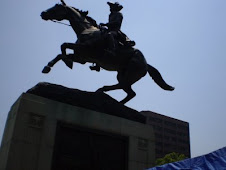Everybody hates everybody else and always has
I've been reading "The Mask of Command," by John Keegan. Keegan discusses four commanders, Alexander, Wellington, Grant, and Hitler. I was particularly keen to learn something about Alexander, about whom I knew nothing, except that he was the son of Philip of Macedon.
Now I have a smattering of information about Alexander, which is sufficient, because my interest is actually in American history. But I did learn something I had long suspected, that the Greek city-states were constantly either at war with each other, just getting over a war with each other, or preparing for such a war. This was their normal state, excepted when threatened by the Persians, whom they hated more than they hated one another.
Similarly, the peacable, nature loving Native Americans of whom Ellizabeth Warren is such a notable example, were constantly fighting with each other. They also had a habit of attacking villages full of settlers who were minding their own business. I know we treated them unfairly, but there is a reason they were featured as bad guys in so many movies.
Anyway, we weren't nearly as mean to them as the British were to the Irish.
But my thesis is not to prove that we are the best country in the world. Although we are. My point is that armed struggle between groups has always existed and always will. There can be no such thing as a War to End All Wars because wars will not end. James Madison, in a different context, wrote: If men were angels, no government would be necessary. Neither would wars, because we would all be too busy with harp lessons and choir practice.
Obama seemed to believe that our disagreements with Russia were all one big misunderstanding which could be settled with a nice comfortable talk with his friend Vlad. Clearly the lovefest did not work, and Putin is re-conquering the former Soviet satellites even though it might upset his friend Barack.
Once we had removed American troops from Iraq, no doubt our government believed that Sunnis and Shi'ites would be having interfaith picnics to explore their common heritage and Kumbaya would be the new official government anthem. Again, this did not happen.











9 comments:
Be interesting to hear what Keegan said of Grant. He was no tactician. He just persevered when so many of predecessors had preferred to break for lunch and a long siesta. "I propose to fight it out on this line if it takes all summer," he told Lincoln. I'd be surprised to hear that Hitler was any sort of military leader.
You should read the book. I'm not sure I agree with all his conclusions, but he's a good writer and knowledgeable.
The line you quoted actually appears in a movie starring Jean Harlow. Apparently it was famous enough to make it to Hollywood.
The Hitler section is the weakest in the book.
You should try a) Grant's Memoirs (2 volumes) which are very direct and modern perhaps because he was dying of cancer when he wrote them for Mark Twain to publish and had no time for folderol and b) Soul of Battle by Victor Davis Hanson, which is about Patton, Sherman and a Greek general whose name I can't spell.
I've read several of Keegan's books including his most famous one The Face of Battle, about Agincourt, using it as the measure of all war, which works pretty well.
I have read Grant's memoirs. I can also recommend a book about his last years by Charles Bracelen Flood. Flood also wrote a book about Grant and Sherman, the title of which I have forgotten, also excellent.
Grant was a man of great integrity, and to their credit the American people realized this and cherished him.
Somehow the man of integrity had one of the crookedest presidential administrations. Up to that point. He's had a lot of competition since then, of course. Flood's book on Grant alone looks interesting, thanks. I took the Kindle sample.
In private life, Grant was gullible and trusting. After he retired, a friend of his son's cheated him out of everything he had. He wa
s literally penniless. Friends baled him out.
His main concern was to earn enough money to support Julia after his death. When he wrote his memoirs he was dying and knew it.
His was actually a noble character. Too bad future presidents did not emulate him.
"Anyway, we weren't nearly as mean to them as the British were to the Irish."
The British, it's true, were quite unpleasant to the Irish -- partly for religious reasons, as the Catholic/Protestant religious wars were going on during several hundred years of the colonization period -- but before they were colonized, the Irish also spent a lot of time fighting each other. As did the Scots. As did -- well, lots of others.
I think we're in violent agreement.
Anonymous seems to be having a private conversation with an imaginary friend.
Post a Comment